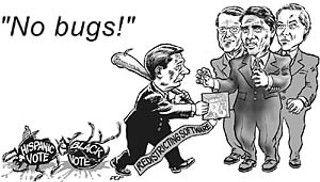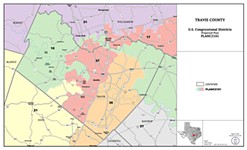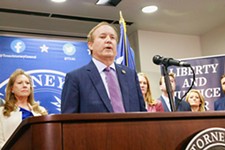Rights and Consequences
The Redistricting trial pits 'partisan gerrymandering' against the Voting Rights Act
By Michael King, Fri., Dec. 19, 2003

The first happy result of the Texas congressional re-redistricting trial, currently proceeding in a federal courtroom at the Homer Thornberry building at Ninth and San Jacinto, might have taken place in Harrison Co. in far Northeast Texas. Thanks to testimony by U.S. Rep. Max Sandlin, D-Marshall, the Harrison Co. Commissioners Court was embarrassed into reconsidering its decision to close the polling station at historically black Wiley College and move it to the largely Anglo and conservative East Texas Baptist University on the other side of Marshall. "They know exactly what they're doing," said Sandlin, describing the decision -- officially prompted by a 17% state budget cut for election support -- as a transparent attempt to make it more difficult for minority voters to reach the polls. "If a Republican banker shows up in the morning at the wrong place," Sandlin said, "he can leave work later and drive across town to vote. But a black working man can't do that -- he won't get paid, or he'll lose his job."
Harrison Co. elections supervisor Pam Brock was quick to insist that the decision, part of a larger budget-cutting move to reduce the number of boxes from 29 to seven, had nothing to do with race, but she also told Quorum Report that she would bring the matter back to the Commissioners Court with the recommendation that the Wiley College box be reinstated. "To say that we were intentionally trying to suppress minority voter turnout is simply untrue." As he testified Friday morning, Sandlin was unaware of the flurry of response his words would generate back in his district. But he told the courtroom, "I don't think there's ever been an instance where they've shut down a white box and moved it to a black area. And there's a reason for that, too."
Sandlin's anecdote was but one of a litany of similar complaints made by Democratic congressmen, their lawyers, and other witnesses testifying in the first few days of the federal trial. The Democrats, and their co-plaintiffs representing state minority organizations, argue that the congressional map adopted by the Republican-dominated Legislature is a calculated effort to disenfranchise black and Latino voters. The state, represented primarily by private attorney Andy Taylor and Solicitor General Ted Cruz, responds that the map was drawn with the explicit and unapologetic intention of increasing the number of Republicans in Congress, and any effect on minority voters is only coincidental with that larger political goal. Taylor pointed repeatedly to the proposed Houston-area District 9 as a new minority district offsetting Democratic complaints about diminished minority influence statewide. "Like it or not," Taylor told the court in his opening statement, "we did create a third [African-American] district, but race did not predominate" in the drawing of the new lines.
U.S. Rep. Jim Turner of Crockett was one of several Democratic congressmen who testified last week, and he found preposterous the notion that Republicans should "get a pass" because they claim their marginalization of the influence of minority Texans is "unintentional." "That is contrary to the fundamental understanding of anyone who ever sat down [at a computer] to draw district lines," Turner said outside the courtroom. "In fact, that is exactly what the Voting Rights Act is designed to prevent. To claim 'no intention' to violate minority voting rights belies a common understanding that all legislators have about map drawing.
"If this map is upheld," Turner concluded, "the Voting Rights Act has no meaning."
Driving the Train
The federal trial formally began Thursday morning following mutual arguments for summary judgment, upon which the three-judge panel declined to rule pending the full hearing. The ample but crowded courtroom contains nearly as many attorneys (necessitating a seating chart) as witnesses and spectators, and for those who have been following the redistricting controversy from its beginnings last spring, the trial has an air of ritual. The judges warned against "repetitive and cumulative" evidence, and the lawyers have been paring their witness lists in order to complete testimony by the end of this week. Barring a rejection of the map on grounds of voting rights violations by the Department of Justice, a decision needs to take effect soon enough to enable January preparations for statewide primaries in March.
Technical testimony, much of it by redistricting expert Allan Lichtman of American University, covered ground familiar from the legislative history, focusing primarily on the effect of new lines on minority voters from Dallas-Fort Worth, through East Texas, and down to the Valley. Lichtman testified that in order to get rid of Rep. Martin Frost's District 24 in Dallas and Tarrant counties, the Republicans "knowingly and intentionally undermined the voting opportunities of African-Americans. ... Their own expert told them they were eliminating a performing majority-minority district," said Lichtman, "and they went ahead and did it anyway." In cross-examining Lichtman, Taylor tried to show that District 24 is not in fact a "performing" minority district and that in any event its elimination in the new map is compensated for by the addition of District 9 in Houston. Lichtman said that in 20 years of following redistricting, he had never seen a Legislature "knowingly wipe off the map" an existing minority opportunity district.
One illuminating bit of evidence was added to the stack last week, as the plaintiffs submitted to the court a series of e-mail memos written to U.S. Rep. Tom DeLay by his aide Jim Ellis, who acted as the liaison between the U.S. House majority leader and the state Republican leadership. If there remained any doubt, the Ellis/DeLay memos make even more plain that DeLay was driving the redistricting train, and moreover that he was determined to impose his priorities on whatever map came out of the Legislature. In summarizing the process for his boss, Ellis repeatedly makes clear that he intends to derail any attempt at a compromise map that might not produce the maximum number of Republican seats or that, more specifically, might enable the re-elections of incumbent Democrats Martin Frost of Dallas, Lloyd Doggett of Austin, and Chet Edwards of Waco. "We must stress," writes Ellis to DeLay in an "update" dated Aug. 17, at a moment when a few members of the Senate Republican caucus were apparently wavering, "that a map that returns Frost, Edwards, and Doggett is unacceptable and not worth all of the time invested into this project."
The attorneys for the Democrats pointed out to the court that the map promoted by Ellis and DeLay (and eventually adopted), even in the GOP's own judgment, presented the most "preclearance risk" under the Voting Rights Act, but also represented the greatest potential Republican gain -- seven seats in Congress, plus eliminating Frost, No. 2 in rank among House Democrats. That theme runs throughout the memos, along with the undeniable sense that the legislative process is being managed from D.C. -- Ellis writes that he must "work" the Republican leadership on the various details of the DeLay map, but notes that with the exception of the GOP dispute over West Texas that briefly delayed final adoption, there is no serious opposition among the Republicans. That consensus apparently extended to the attorney general's office, as AG Greg Abbott was among the five Republican "principals" called together to meet in Austin on June 16 "to agree on a legislative strategy and calendar" (the others were DeLay, Gov. Rick Perry, Lt. Gov. David Dewhurst, and House Speaker Tom Craddick).
Abbott has attended the trial but is leaving the state's defense to Taylor and Cruz, whom he called "the best and the brightest." Outside the courtroom he rejected any suggestion that his role in the Republican redistricting sessions over the summer might have compromised his office, or that he was acting as anything other than official legal counsel to state leaders. "Our only role was to answer questions concerning what is or is not legal," Abbott said. "It would be factually erroneous to suggest that we were involved in the planning or drawing of the actual map. We gave legal advice." Ellis mentions no legal issues to be addressed at the June 16 meeting, although he does note the necessity to press for a personal commitment to DeLay from Dewhurst to pass a redistricting bill out of the Senate. (For all the available Ellis memos as submitted to the court, see austinchronicle.com.)
Turning Back the Clock
It's hard to tell what effect, if any, the early days of testimony are having on the three-judge panel. Presiding Judge Patrick Higginbotham made plain at the outset that he is skeptical of the notion that redistricting can ever be anything other than partisan, recalling former Lt. Gov. Bill Hobby's description of the process as a "religious experience" whereby "you get down on your knees with a grease pencil and a map, and reward your friends and punish your enemies." He and Judge Lee Rosenthal (John Ward, the sole Democratic appointee, has been almost entirely silent) were dubious of "public policy" reasons, however meritorious, offered for judicial intervention, and repeatedly asked the attorneys and witnesses for "legal authority" to justify any court action against a map drawn by the Legislature. Several lawyers made the argument in passing that implicit in the U.S. Constitution's requirement that redistricting take place every 10 years, after the decennial census, is a corollary -- that having abandoned that task to the courts in 2001, the Legislature could not now take it up again (a notion roundly mocked by the state attorney Taylor). The panel's rejection (as expected) of both sides' calls for summary judgment was enough to move AG Abbott to declare immediate victory. "If the judges were going to decide in favor of the plaintiffs," Abbott told the Houston Chronicle, "we wouldn't be going forward with this legal exercise."
But the judges were also not audibly unsympathetic to the testimony from a string of plaintiffs' witnesses -- including Sandlin, Edwards, Frost, Turner, and San Antonio Rep. Charles Gonzalez, as well as former Dallas mayor and 2002 U.S. Senate candidate Ron Kirk -- that the effect of the Republican map is to marginalize or disenfranchise entirely the votes of minority Texans, all over Texas, but especially in the six or seven districts explicitly targeted by the map that are now held by white Democrats. Higginbotham asked the congressmen whether the "political process" could be relied upon eventually to correct the injustices they described, and none was optimistic. Sandlin said that the new East Texas districts would make it virtually impossible for minority voters to have any influence on either the choice or the policies of their congressmen, adding, "If you do this [allow the proposed map to stand], you're going to set back our clock 50 years."
Sandlin and Turner, in recounting the segregationist history of East Texas, each noted that if the Voting Rights Act is to mean anything substantive, it must mean that minority voters possess not only the literal right to vote but also the opportunity for effective participation in the political process. Sandlin said that the reconfiguration of his rural District 1 into three districts, each now dominated by suburban Republicans, "absolutely destroyed" any effective minority influence throughout the region. The implicit message to African-Americans, he said, is that "We're going to let you vote, but we're going to rig it so your vote doesn't count."
In his opening remarks, attorney Morris Overstreet (former judge of the state Court of Criminal Appeals, and to date the highest-ranking African-American statewide official in Texas history, representing here the Texas Coalition of Black Democrats) recalled the Southern legacy of denial of voting rights to minority citizens and noted that it was always cloaked in legalism, "code words" like the "poll tax" or "literacy tests" and similar restrictions. "Now the code word is 'partisan gerrymandering,'" continued Overstreet, referring to the state's defense of its actions. Partisan gerrymandering, he said, simply continues the tradition of finding a nominally legal way to deny people their rights, because "to achieve their goal, [the Republicans] have to break up communities of interest and coalitions that have been built up over 30 years of hard work" since the civil rights movement.
Overstreet asked that the judges, in making their decision over whether the map is legal, "Don't look at what they say it is, look at the results. Look at the consequences of their greed."
In testimony Monday, Laredo state Rep. Richard Raymond compared the effects of the Republican remap on minority voters to the collateral damage in an armed robbery. The robber may have only wanted the money -- or in this case, the additional congressional seats, said Raymond -- "but we were standing at the door. They pulled the trigger, that is what they did." But the star witness Monday -- and the most difficult for Taylor so far -- was John Alford, a Rice University professor and expert in congressional redistricting who in fact served as a Republican consultant in the 2001 redistricting process that produced the current legislative maps but foundered on the congressional map, eventually drawn by a federal court. He agreed that state voting patterns justify additional Republican districts, "but this goes beyond that and makes the district lines produce the seats, and not the elections."
Alford said that in order to produce the maximum number of Republican districts, the remappers were required to use "an excessive concern with race" and in a curious fashion: They drew lines "that place importance on the race of representatives rather than the race of voters." Alford testified that while some say he's "changed sides" by serving as an expert for the Democrats, "I haven't changed, although first I lost my Democratic friends and now I've lost my Republican friends."
Under questioning by the Democrats' attorneys, Alford called the proposed Republican map "inappropriate" on both policy and constitutional grounds and described it as the outcome of "aggressive partisan gerrymandering" that has inevitably run afoul of the limits established by the Voting Rights Act. He said that as he understands the law and recent court rulings, the remappers cannot simply claim partisan goals as a defense against violations of the VRA, nor the creation of designated minority seats as offsetting damage to minority interests elsewhere in the state. "This is a map that is about eliminating Anglo Democrats, even if they represent minority voters," Alford said, and suggested the court needed to find standards to place reasonable limits on partisan gerrymandering. ![]()
Got something to say on the subject? Send a letter to the editor.










